

Articles

The article shows the results of research of the musical taste of Polish musicians based on the analysis of their verdicts in the Eurovision Song Contest. Poles made their debut in the Eurovision Song Contest in 1994. At that time, the winners were chosen only by the jurors, but from 1998 to 2008 they were mainly chosen by the viewers. Since 2009 the winner has been chosen by the jurors and the viewers. According to Pierre Bourdieu’s theory, juries are composed of members of the dominant class (Warnerian approach) or the middle class (Holtian approach). The audience is a mixture of the dominant, middle, and low class. Based on this theory, the music taste of the jurors should be very different from the music taste of the audience. The author checks whether this is true and concludes that the theory of aesthetic omnivorism better explains the contemporary distribution of tastes than Pierre Bourdieu’s theory.
Bourdieu, P. (2008). Co tworzy klasę społeczną? O teoretycznym i praktycznym istnieniu grup. Recykling idei, 11, 36–46.
Bourdieu, P. (2005). Dystynkcja. Społeczna krytyka władzy sądzenia. SCHOLAR.
Bourdieu, P., Wacquant, L. (2001). Zaproszenie do socjologii refleksyjnej. Oficyna Naukowa.
Chodkowski, A. (Red.) (1995). Encyklopedia muzyki. PWN.
Domański, H., Przybysz, D., Wyrzykowska, K., Zawadzka, K. (2021). Dystynkcje muzyczne. Stratyfikacja społeczna i gusty muzyczne Polaków. SCHOLAR.
Ekiert, J. (1994). Bliżej muzyki. Encyklopedia. Wiedza Powszechna.
Jabłońska, B. (2019). Socjologia muzyki a krytyczna analiza dyskursu. Miscellanea Anthropologica et Sociologica, 20(2), 36–55.
Pałuba, D. (2020). Konkurs Piosenki Eurowizji jako wartościowy przedmiot badania socjologicznego. Studia Socjologiczno-Polityczne, 1(12), 147–159.
Peterson, R., Kern, R. (1996). Changing Highbrow Taste: From Snob to Omnivore. American Sociological Review, 61(5), 900–907.
Raykoff, I. (2021). Another Song for Europe. Music, Taste, and Values in the Eurovision Song Contest. Routledge.
Veblen, T. (2008). Teoria klasy próżniaczej. MUZA SA.
Woźniak, K. (2019). Muzyka alternatywna – co to znaczy, co to za gatunek, przykładowi artyści. Dostęp 9 marca 2023 z https://www.antyradio.pl/muzyka/Rock-News/muzyka-alternatywna-co-to-znaczyco-to-za-gatunek-29692.
Zarycki, T. (2008). Kapitał kulturowy. Inteligencja w Polsce i w Rosji. Wydawnictwo Uniwersytetu Warszawskiego.
Żmigrodzki, P. (Red.) (2007). Wielki słownik języka polskiego PAN. Dostęp 9 marca 2023 z https://wsjp.pl/haslo/podglad/36822/ballada/4897241/muzyczna.